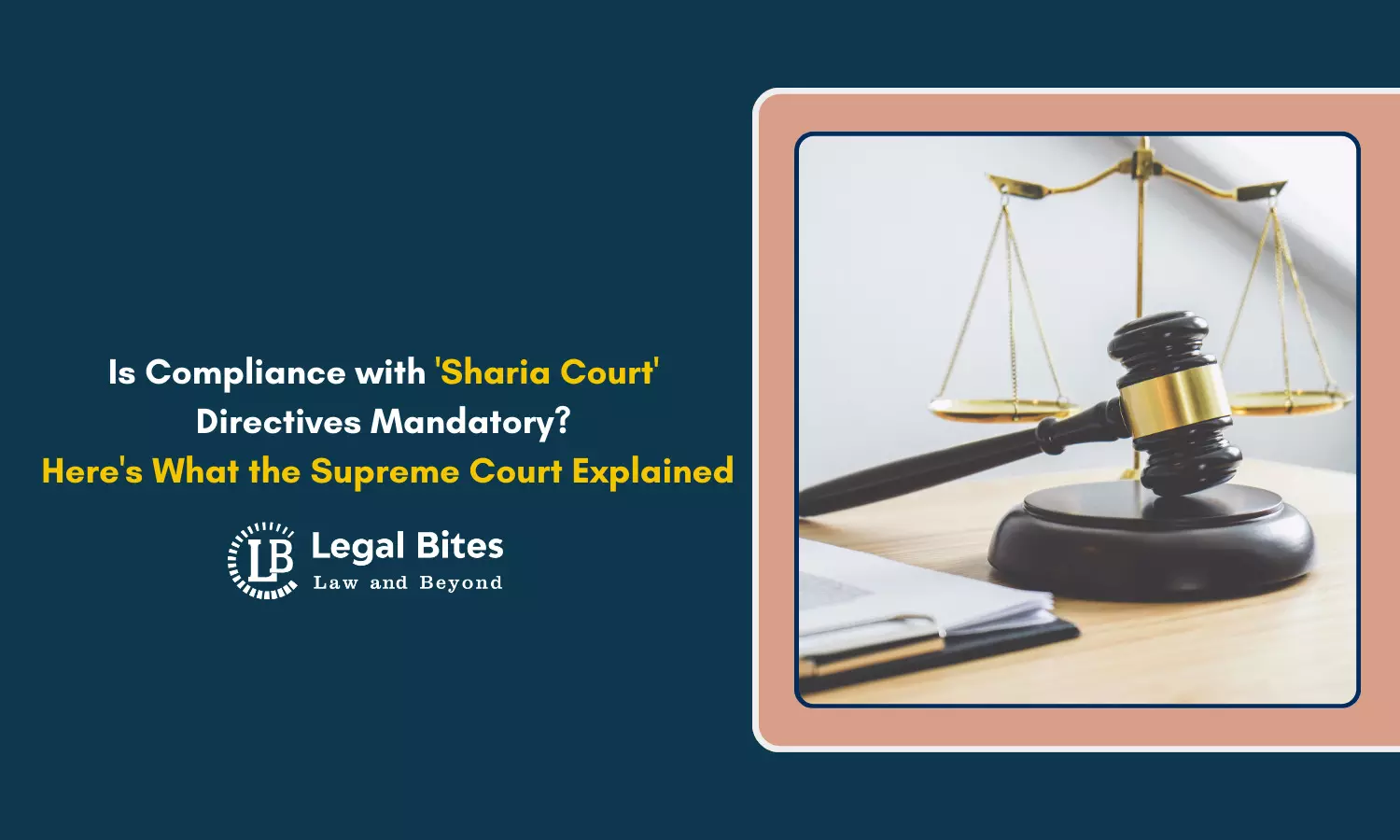
In a significant ruling, the Supreme Court of India in Shahjahan v. State of Uttar Pradesh & Anr. (2025 INSC 528) clarified that directives, decisions, or “fatwas” issued by so-called “Sharia Courts,” “Courts of Kazi,” or “Darul Kajiyat” have no legal recognition under Indian law. The judgment reiterates the primacy of statutory courts established by law and stresses that no religious or community forum can claim judicial authority unless sanctioned by the Constitution or statute.
This case arose from a maintenance dispute wherein the husband attempted to rely on divorce declarations obtained from a “Sharia Court,” leading the Court to reiterate foundational principles regarding the status of such bodies and their pronouncements.
Factual Background
The appellant-wife and the respondent-husband solemnised their marriage in 2002 under Islamic rites. It was a second marriage for both. The couple had two children: Aatika (now an adult) and Muzammil (a minor).
- In 2005, the husband filed a divorce petition before a “Court of Kazi” in Bhopal, Madhya Pradesh, which ended in a compromise.
- In 2008, the husband once again initiated divorce proceedings before a “Darul Kaja (Kajiyat)” in Bhopal and obtained a Talaqnama in January 2009.
The appellant-wife, meanwhile, filed a maintenance petition under Section 125 of the Code of Criminal Procedure, 1973 (CrPC), [now under Section 144 of Bharatiya Nagarik Suraksha Sanhita (BNSS)], seeking maintenance for herself and her children.
The Family Court, however, rejected her maintenance claim, awarding a nominal sum only to the children. The High Court upheld this view. The appellant challenged these decisions before the Supreme Court.
Issues
- Whether the findings of the lower courts denying maintenance to the appellant were legally sustainable.
- Whether divorce granted by a “Sharia Court” had any legal force.
- Whether maintenance under Section 125 CrPC [now under Section 144 of BNSS] should be awarded from the date of application or order.
- Whether compliance with ‘Sharia Court’ directives is mandatory under Indian law.
Supreme Court’s Analysis and Findings
1. Non-recognition of ‘Sharia Courts’ and Similar Institutions
The Court observed that bodies such as “Court of Kazi,” “Court of Darul Kaja,” “Sharia Court,” etc., have no legal recognition under Indian law. Citing its earlier decision in Vishwa Lochan Madan v. Union of India (2014) 7 SCC 707, the Court emphasised:
- Only courts created and sanctioned by statute have the authority to adjudicate disputes.
- Religious edicts or fatwas have no binding force on citizens.
- Individuals may voluntarily act upon religious pronouncements, provided it does not conflict with any law.
- Any attempt to impose or enforce a fatwa or religious decision coercively would be illegal and punishable under the law.
Thus, the Court reinforced the principle that secular statutory courts are the only lawful adjudicators of civil and criminal disputes in India.
“‘Sharia Courts’ or ‘Darul Kajiyat’ by whatever name styled have no recognition in law. Any declaration/decision by such bodies is not binding and unenforceable through any coercive means.”
2. Maintenance for the Wife: Correcting Errors of the Lower Courts
The Court found that:
- The Family Court and the High Court wrongly presumed that dowry demands could not exist because it was a second marriage.
- The Family Court misinterpreted the compromise deed of 2005, assuming the wife admitted misconduct, although no such admission was recorded.
- The appellant was turned out of the matrimonial home after being subjected to abuse and cruelty, which justified her living separately.
Hence, the denial of maintenance to the appellant-wife was legally unsustainable.
3. Date from Which Maintenance Is Payable
The Court reaffirmed its stand in Rajnesh v. Neha (2021) 2 SCC 324:
- Maintenance should ordinarily be awarded from the date of application and not from the date of order.
- The object of maintenance laws is to prevent destitution and ensure financial support.
- Delays caused by court processes should not disadvantage the claimant.
Accordingly, the Court ordered that maintenance for both the appellant-wife and the children should be calculated from the date of filing of the maintenance petition.
4. Updated Maintenance Amount
Considering the passage of time and the cost of living increases:
- The appellant-wife was awarded ₹4,000 per month from the date of filing the maintenance petition.
- The children’s maintenance continued, with the daughter’s entitlement ending upon her attaining majority.
- All arrears were directed to be cleared by the husband within four months.
Broader Implications
This judgment reinforces several important principles:
(a) Supremacy of Constitutionally Recognised Courts
Any adjudicatory process must derive its authority from a valid law. Religious or private bodies cannot usurp the role of courts established under the Constitution.
(b) Protection of Vulnerable Individuals
Section 125 CrPC (now Section 144 of BNSS) is a social welfare provision aimed at protecting women and children from destitution. Courts must interpret it liberally and purposively to uphold dignity and survival.
(c) Curtailing Misuse of Religious Forums
By reiterating that Sharia Courts or Darul Qazas have no coercive authority, the Supreme Court seeks to prevent social pressure from translating into illegal, unconstitutional coercion.
Conclusion
The Supreme Court’s judgment in Shahjahan v. State of Uttar Pradesh & Anr. (2025) is a powerful affirmation of the rule of law, constitutional supremacy, and protection of human dignity in India. It holds that compliance with ‘Sharia Court’ directives is not mandatory and that individuals are free to ignore such pronouncements unless voluntarily accepted within the bounds of secular law.
Religious opinions may guide personal conscience, but cannot be a substitute for legally enforceable rights and obligations. By firmly demarcating the line between faith and law, the Supreme Court has once again protected the fabric of India’s secular constitutional democracy.